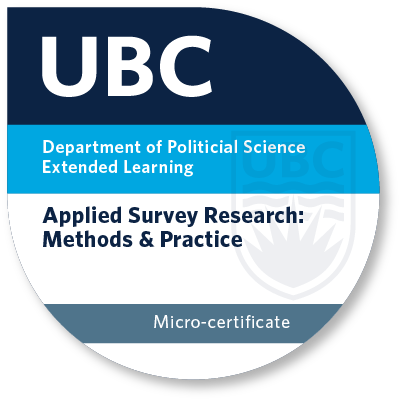This course comprises the UBC Micro-certificate in Applied Survey Research: Methods & Practice.
Survey research, also known as opinion polling, offers a window into people's attitudes, experiences and sentiments on a wide range of issues. With the rise of digital platforms, it’s easier than ever to gather data quickly and efficiently, making polling a key element in decision-making processes in politics, government, business, non-profit sector and media.
However, while surveys can provide valuable insights, they are not without their pitfalls. Poor sampling methods, biased question design, and misinterpretation of data can lead to misleading results, making it crucial for polls to be conducted with rigor and transparency.
This 10-week online course introduces the fundamentals of survey research. It offers a practical, experiential approach covering all aspects of the survey research process, ensuring learners emerge with the knowledge and skills to conduct surveys that are valid, reliable and informative.
By the end of this course, you will be able to:
- Understand the core concepts of survey research
- Effectively design surveys, including question wording and sequence
- Identify and mitigate potential biases in the polling process Understand sampling and the various kinds of sampling errors
- Conduct data analysis based on streamlined statistical ideas
- Analyze your own survey data and report on its results
- Communicate survey data to different audiences
- Recognize and evaluate the survey methodologies used in news stories, policy reports and academic work
- Think critically about whether and how to use survey methodologies in your own work
Course details
Course outline
The Art & Science of Applied Survey Research provides a comprehensive introduction to the key principles of survey research. The curriculum focuses on practical, experiential learning that equips students with the skills to produce accurate survey results that truly reflect attitudes and opinions. Tailor learning to suit your specific interests, including selecting a topic of your choice for the capstone project.
Module 1: Introduction to Survey Research: Core Concepts
Module 2: Who do we interview?
Module 3: What do we ask?
Module 4: How do we represent peoples’ views?
Final Capstone Module: Survey Research Project
How am I assessed?
You’re assessed on successfully completing each topic module and the capstone survey research project submitted at the end of the course.
The modules are assessed using a mix of multiple-choice and longer-form assessment questions. You are graded on a pass or fail basis, and you must pass all modules to obtain the micro-certificate.
The capstone survey research project will receive a numerical grade and a qualitative assessment with written feedback from your instructor.
Expected effort
Expect to spend approximately three to five hours a week completing the topic modules and online assessments. During the capstone phase, expect to spend approximately 10 hours a week attending the online real-time workshops and working on the final project.
Technology requirements
All course content is provided in the online courses. To take this program, you'll need access to:
- an email account
- a computer, laptop or tablet, using Windows or macOS
- the latest version of a web browser (or previous major version release
- a reliable internet connection
- a video camera and microphone (for the real-time virtual sessions)
Course format
This part-time 100% online program is instructor supported and combines independent study with real-time online workshop sessions. In addition, get real-time support during weekly virtual office hours.
On your own time you can access online materials, work through Modules 1 to 4 and the mini-modules and complete the associated online questions and quizzes. For the final capstone module, students attend several real-time online workshop sessions with instructors and other students in addition to working on their project independently.
